BBC Organisational Behaviour: Culture, Motivation and Team Dynamics.
VerifiedAdded on 2020/06/06
|14
|4595
|48
Report
AI Summary
This report delves into the organisational behaviour of the British Broadcasting Corporation (BBC), examining the impact of culture, power, and politics on its operations. It analyses Handy's cultural typology in relation to the BBC's earlier culture and explores how culture, power, and politics affect behaviour within the BBC, both in the past and present. The report discusses various motivation theories, such as Maslow's need hierarchy, Herzberg's motivation-hygiene theory, McClelland's need theory, McGregor's participation theory, and Vroom's expectancy theory, and their application to improve team effectiveness within the BBC. It identifies different types of teams within the BBC and the theories that contribute to their effectiveness. Furthermore, the report explores how organisational theory can enhance team performance and productivity, while also addressing barriers to effective performance within the BBC. The analysis highlights the importance of a positive work environment, fair treatment of employees, and the delegation of power to foster motivation and improve overall organisational performance. Desklib provides access to similar past papers and solved assignments for students.
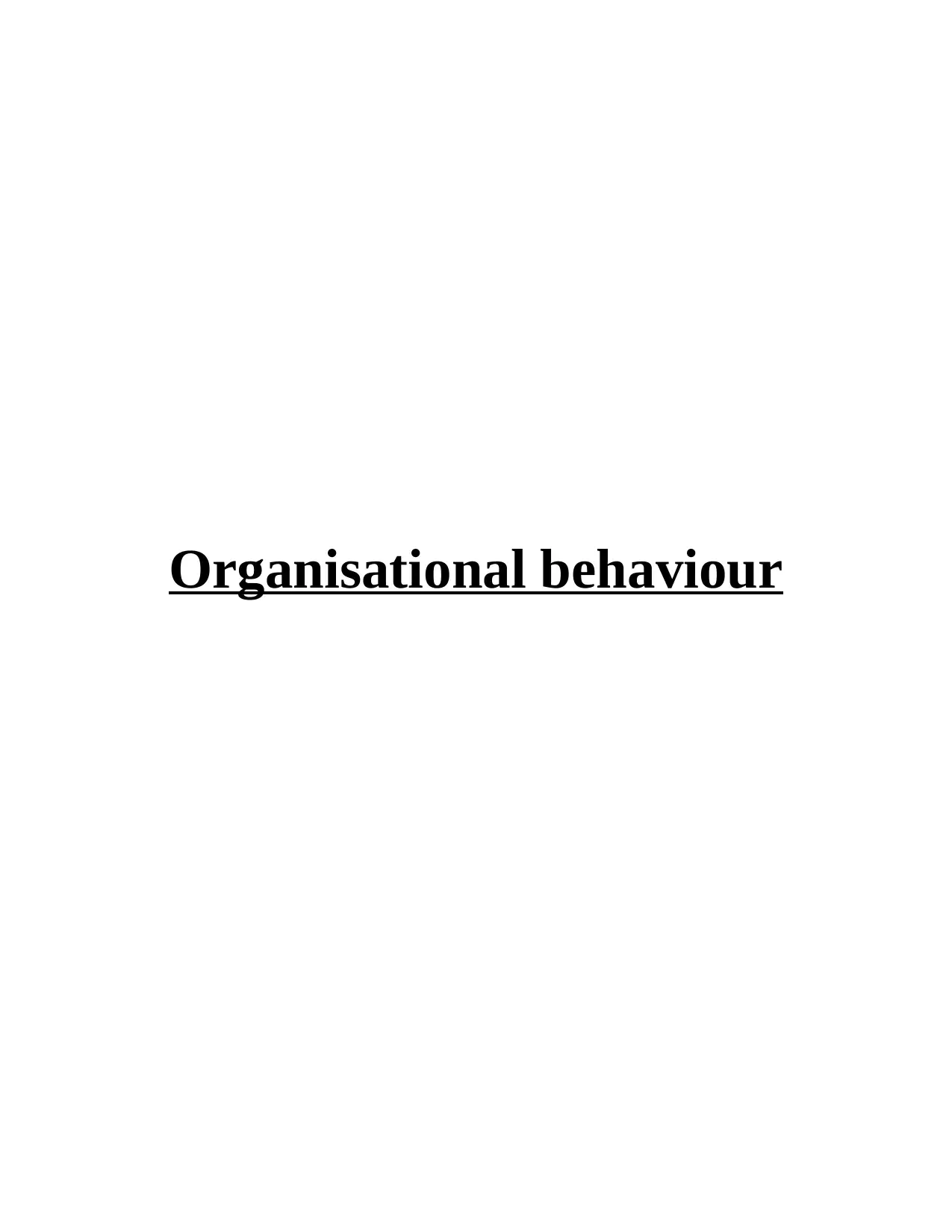
Organisational behaviour
Paraphrase This Document
Need a fresh take? Get an instant paraphrase of this document with our AI Paraphraser
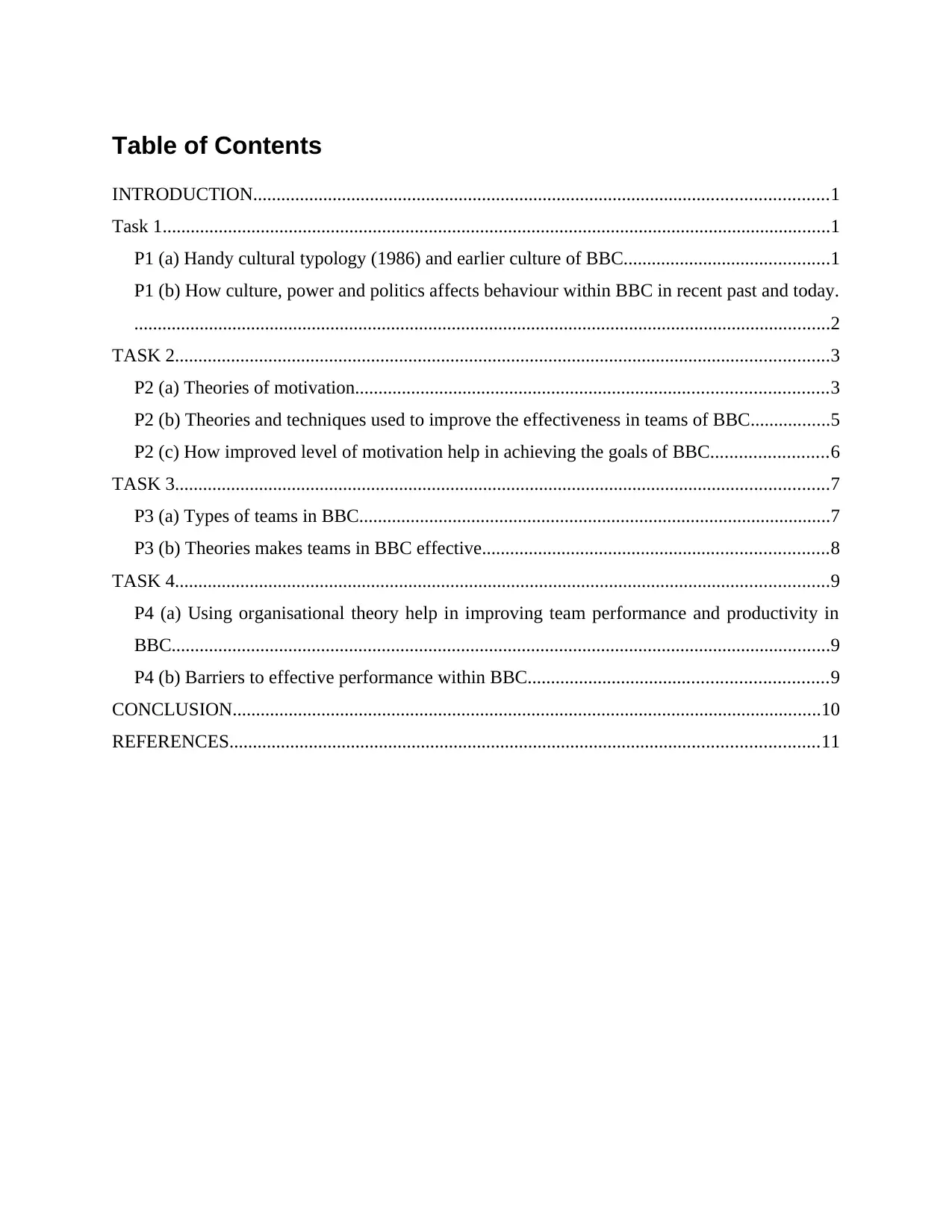
Table of Contents
INTRODUCTION...........................................................................................................................1
Task 1...............................................................................................................................................1
P1 (a) Handy cultural typology (1986) and earlier culture of BBC............................................1
P1 (b) How culture, power and politics affects behaviour within BBC in recent past and today.
.....................................................................................................................................................2
TASK 2............................................................................................................................................3
P2 (a) Theories of motivation.....................................................................................................3
P2 (b) Theories and techniques used to improve the effectiveness in teams of BBC.................5
P2 (c) How improved level of motivation help in achieving the goals of BBC.........................6
TASK 3............................................................................................................................................7
P3 (a) Types of teams in BBC.....................................................................................................7
P3 (b) Theories makes teams in BBC effective..........................................................................8
TASK 4............................................................................................................................................9
P4 (a) Using organisational theory help in improving team performance and productivity in
BBC.............................................................................................................................................9
P4 (b) Barriers to effective performance within BBC................................................................9
CONCLUSION..............................................................................................................................10
REFERENCES..............................................................................................................................11
INTRODUCTION...........................................................................................................................1
Task 1...............................................................................................................................................1
P1 (a) Handy cultural typology (1986) and earlier culture of BBC............................................1
P1 (b) How culture, power and politics affects behaviour within BBC in recent past and today.
.....................................................................................................................................................2
TASK 2............................................................................................................................................3
P2 (a) Theories of motivation.....................................................................................................3
P2 (b) Theories and techniques used to improve the effectiveness in teams of BBC.................5
P2 (c) How improved level of motivation help in achieving the goals of BBC.........................6
TASK 3............................................................................................................................................7
P3 (a) Types of teams in BBC.....................................................................................................7
P3 (b) Theories makes teams in BBC effective..........................................................................8
TASK 4............................................................................................................................................9
P4 (a) Using organisational theory help in improving team performance and productivity in
BBC.............................................................................................................................................9
P4 (b) Barriers to effective performance within BBC................................................................9
CONCLUSION..............................................................................................................................10
REFERENCES..............................................................................................................................11
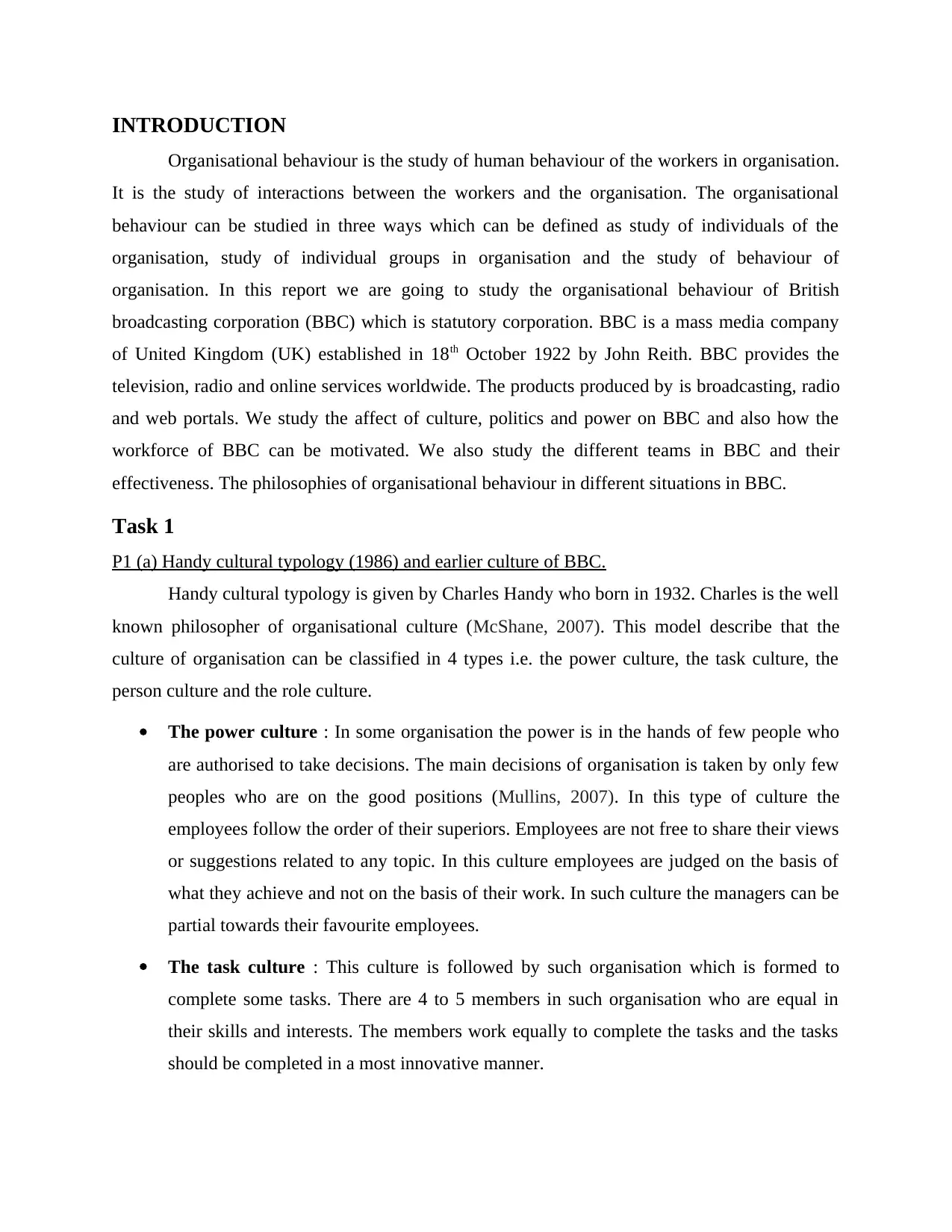
INTRODUCTION
Organisational behaviour is the study of human behaviour of the workers in organisation.
It is the study of interactions between the workers and the organisation. The organisational
behaviour can be studied in three ways which can be defined as study of individuals of the
organisation, study of individual groups in organisation and the study of behaviour of
organisation. In this report we are going to study the organisational behaviour of British
broadcasting corporation (BBC) which is statutory corporation. BBC is a mass media company
of United Kingdom (UK) established in 18th October 1922 by John Reith. BBC provides the
television, radio and online services worldwide. The products produced by is broadcasting, radio
and web portals. We study the affect of culture, politics and power on BBC and also how the
workforce of BBC can be motivated. We also study the different teams in BBC and their
effectiveness. The philosophies of organisational behaviour in different situations in BBC.
Task 1
P1 (a) Handy cultural typology (1986) and earlier culture of BBC.
Handy cultural typology is given by Charles Handy who born in 1932. Charles is the well
known philosopher of organisational culture (McShane, 2007). This model describe that the
culture of organisation can be classified in 4 types i.e. the power culture, the task culture, the
person culture and the role culture.
The power culture : In some organisation the power is in the hands of few people who
are authorised to take decisions. The main decisions of organisation is taken by only few
peoples who are on the good positions (Mullins, 2007). In this type of culture the
employees follow the order of their superiors. Employees are not free to share their views
or suggestions related to any topic. In this culture employees are judged on the basis of
what they achieve and not on the basis of their work. In such culture the managers can be
partial towards their favourite employees.
The task culture : This culture is followed by such organisation which is formed to
complete some tasks. There are 4 to 5 members in such organisation who are equal in
their skills and interests. The members work equally to complete the tasks and the tasks
should be completed in a most innovative manner.
Organisational behaviour is the study of human behaviour of the workers in organisation.
It is the study of interactions between the workers and the organisation. The organisational
behaviour can be studied in three ways which can be defined as study of individuals of the
organisation, study of individual groups in organisation and the study of behaviour of
organisation. In this report we are going to study the organisational behaviour of British
broadcasting corporation (BBC) which is statutory corporation. BBC is a mass media company
of United Kingdom (UK) established in 18th October 1922 by John Reith. BBC provides the
television, radio and online services worldwide. The products produced by is broadcasting, radio
and web portals. We study the affect of culture, politics and power on BBC and also how the
workforce of BBC can be motivated. We also study the different teams in BBC and their
effectiveness. The philosophies of organisational behaviour in different situations in BBC.
Task 1
P1 (a) Handy cultural typology (1986) and earlier culture of BBC.
Handy cultural typology is given by Charles Handy who born in 1932. Charles is the well
known philosopher of organisational culture (McShane, 2007). This model describe that the
culture of organisation can be classified in 4 types i.e. the power culture, the task culture, the
person culture and the role culture.
The power culture : In some organisation the power is in the hands of few people who
are authorised to take decisions. The main decisions of organisation is taken by only few
peoples who are on the good positions (Mullins, 2007). In this type of culture the
employees follow the order of their superiors. Employees are not free to share their views
or suggestions related to any topic. In this culture employees are judged on the basis of
what they achieve and not on the basis of their work. In such culture the managers can be
partial towards their favourite employees.
The task culture : This culture is followed by such organisation which is formed to
complete some tasks. There are 4 to 5 members in such organisation who are equal in
their skills and interests. The members work equally to complete the tasks and the tasks
should be completed in a most innovative manner.
⊘ This is a preview!⊘
Do you want full access?
Subscribe today to unlock all pages.

Trusted by 1+ million students worldwide
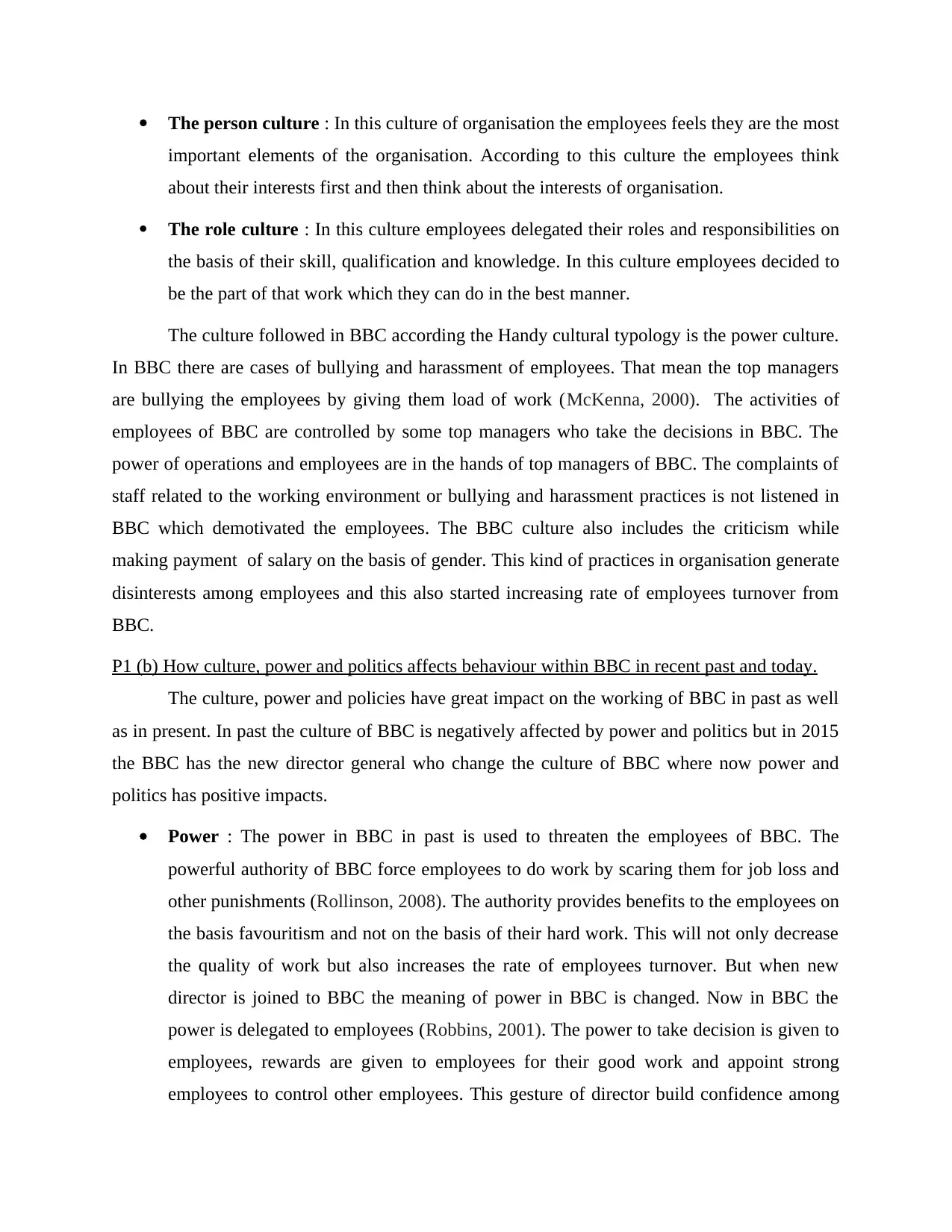
The person culture : In this culture of organisation the employees feels they are the most
important elements of the organisation. According to this culture the employees think
about their interests first and then think about the interests of organisation.
The role culture : In this culture employees delegated their roles and responsibilities on
the basis of their skill, qualification and knowledge. In this culture employees decided to
be the part of that work which they can do in the best manner.
The culture followed in BBC according the Handy cultural typology is the power culture.
In BBC there are cases of bullying and harassment of employees. That mean the top managers
are bullying the employees by giving them load of work (McKenna, 2000). The activities of
employees of BBC are controlled by some top managers who take the decisions in BBC. The
power of operations and employees are in the hands of top managers of BBC. The complaints of
staff related to the working environment or bullying and harassment practices is not listened in
BBC which demotivated the employees. The BBC culture also includes the criticism while
making payment of salary on the basis of gender. This kind of practices in organisation generate
disinterests among employees and this also started increasing rate of employees turnover from
BBC.
P1 (b) How culture, power and politics affects behaviour within BBC in recent past and today.
The culture, power and policies have great impact on the working of BBC in past as well
as in present. In past the culture of BBC is negatively affected by power and politics but in 2015
the BBC has the new director general who change the culture of BBC where now power and
politics has positive impacts.
Power : The power in BBC in past is used to threaten the employees of BBC. The
powerful authority of BBC force employees to do work by scaring them for job loss and
other punishments (Rollinson, 2008). The authority provides benefits to the employees on
the basis favouritism and not on the basis of their hard work. This will not only decrease
the quality of work but also increases the rate of employees turnover. But when new
director is joined to BBC the meaning of power in BBC is changed. Now in BBC the
power is delegated to employees (Robbins, 2001). The power to take decision is given to
employees, rewards are given to employees for their good work and appoint strong
employees to control other employees. This gesture of director build confidence among
important elements of the organisation. According to this culture the employees think
about their interests first and then think about the interests of organisation.
The role culture : In this culture employees delegated their roles and responsibilities on
the basis of their skill, qualification and knowledge. In this culture employees decided to
be the part of that work which they can do in the best manner.
The culture followed in BBC according the Handy cultural typology is the power culture.
In BBC there are cases of bullying and harassment of employees. That mean the top managers
are bullying the employees by giving them load of work (McKenna, 2000). The activities of
employees of BBC are controlled by some top managers who take the decisions in BBC. The
power of operations and employees are in the hands of top managers of BBC. The complaints of
staff related to the working environment or bullying and harassment practices is not listened in
BBC which demotivated the employees. The BBC culture also includes the criticism while
making payment of salary on the basis of gender. This kind of practices in organisation generate
disinterests among employees and this also started increasing rate of employees turnover from
BBC.
P1 (b) How culture, power and politics affects behaviour within BBC in recent past and today.
The culture, power and policies have great impact on the working of BBC in past as well
as in present. In past the culture of BBC is negatively affected by power and politics but in 2015
the BBC has the new director general who change the culture of BBC where now power and
politics has positive impacts.
Power : The power in BBC in past is used to threaten the employees of BBC. The
powerful authority of BBC force employees to do work by scaring them for job loss and
other punishments (Rollinson, 2008). The authority provides benefits to the employees on
the basis favouritism and not on the basis of their hard work. This will not only decrease
the quality of work but also increases the rate of employees turnover. But when new
director is joined to BBC the meaning of power in BBC is changed. Now in BBC the
power is delegated to employees (Robbins, 2001). The power to take decision is given to
employees, rewards are given to employees for their good work and appoint strong
employees to control other employees. This gesture of director build confidence among
Paraphrase This Document
Need a fresh take? Get an instant paraphrase of this document with our AI Paraphraser
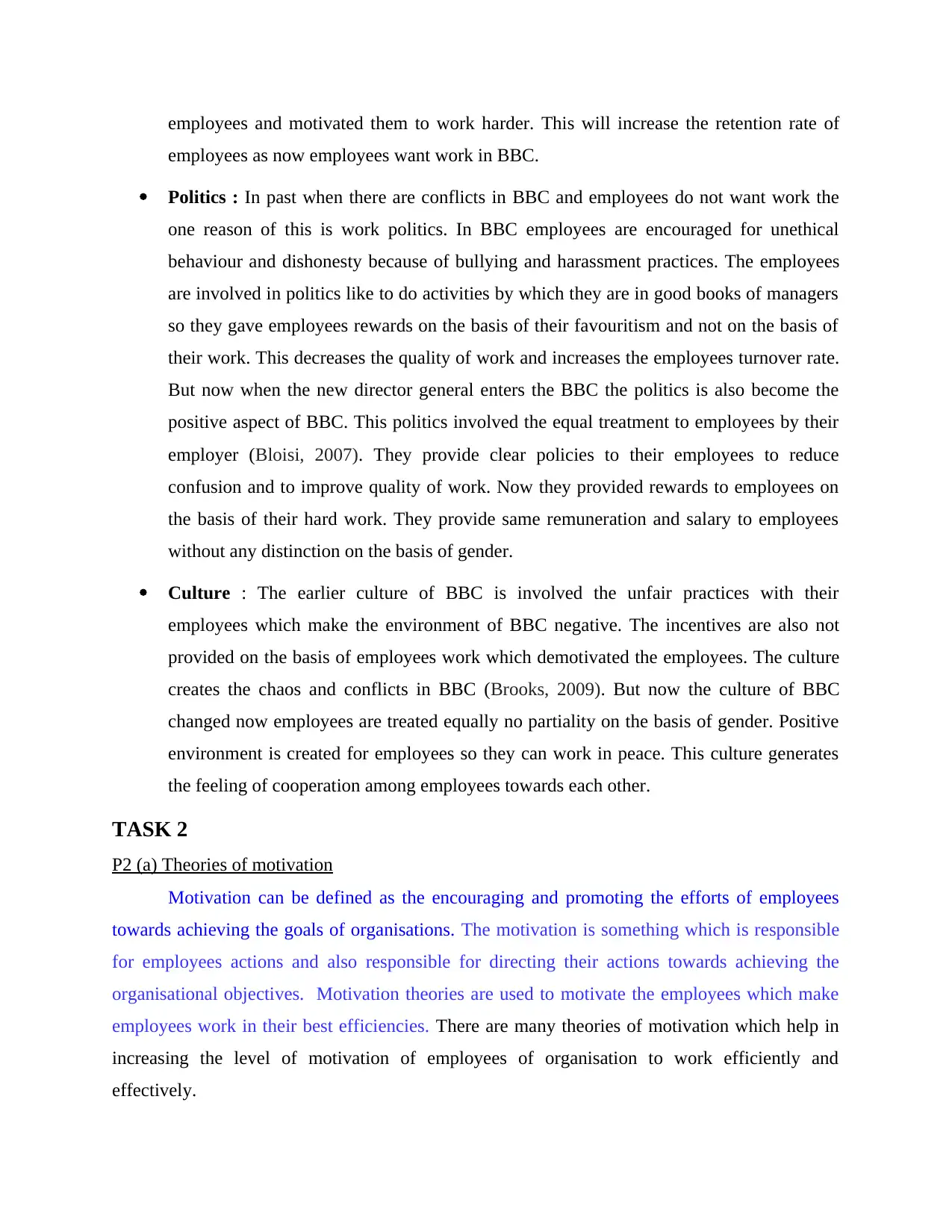
employees and motivated them to work harder. This will increase the retention rate of
employees as now employees want work in BBC.
Politics : In past when there are conflicts in BBC and employees do not want work the
one reason of this is work politics. In BBC employees are encouraged for unethical
behaviour and dishonesty because of bullying and harassment practices. The employees
are involved in politics like to do activities by which they are in good books of managers
so they gave employees rewards on the basis of their favouritism and not on the basis of
their work. This decreases the quality of work and increases the employees turnover rate.
But now when the new director general enters the BBC the politics is also become the
positive aspect of BBC. This politics involved the equal treatment to employees by their
employer (Bloisi, 2007). They provide clear policies to their employees to reduce
confusion and to improve quality of work. Now they provided rewards to employees on
the basis of their hard work. They provide same remuneration and salary to employees
without any distinction on the basis of gender.
Culture : The earlier culture of BBC is involved the unfair practices with their
employees which make the environment of BBC negative. The incentives are also not
provided on the basis of employees work which demotivated the employees. The culture
creates the chaos and conflicts in BBC (Brooks, 2009). But now the culture of BBC
changed now employees are treated equally no partiality on the basis of gender. Positive
environment is created for employees so they can work in peace. This culture generates
the feeling of cooperation among employees towards each other.
TASK 2
P2 (a) Theories of motivation
Motivation can be defined as the encouraging and promoting the efforts of employees
towards achieving the goals of organisations. The motivation is something which is responsible
for employees actions and also responsible for directing their actions towards achieving the
organisational objectives. Motivation theories are used to motivate the employees which make
employees work in their best efficiencies. There are many theories of motivation which help in
increasing the level of motivation of employees of organisation to work efficiently and
effectively.
employees as now employees want work in BBC.
Politics : In past when there are conflicts in BBC and employees do not want work the
one reason of this is work politics. In BBC employees are encouraged for unethical
behaviour and dishonesty because of bullying and harassment practices. The employees
are involved in politics like to do activities by which they are in good books of managers
so they gave employees rewards on the basis of their favouritism and not on the basis of
their work. This decreases the quality of work and increases the employees turnover rate.
But now when the new director general enters the BBC the politics is also become the
positive aspect of BBC. This politics involved the equal treatment to employees by their
employer (Bloisi, 2007). They provide clear policies to their employees to reduce
confusion and to improve quality of work. Now they provided rewards to employees on
the basis of their hard work. They provide same remuneration and salary to employees
without any distinction on the basis of gender.
Culture : The earlier culture of BBC is involved the unfair practices with their
employees which make the environment of BBC negative. The incentives are also not
provided on the basis of employees work which demotivated the employees. The culture
creates the chaos and conflicts in BBC (Brooks, 2009). But now the culture of BBC
changed now employees are treated equally no partiality on the basis of gender. Positive
environment is created for employees so they can work in peace. This culture generates
the feeling of cooperation among employees towards each other.
TASK 2
P2 (a) Theories of motivation
Motivation can be defined as the encouraging and promoting the efforts of employees
towards achieving the goals of organisations. The motivation is something which is responsible
for employees actions and also responsible for directing their actions towards achieving the
organisational objectives. Motivation theories are used to motivate the employees which make
employees work in their best efficiencies. There are many theories of motivation which help in
increasing the level of motivation of employees of organisation to work efficiently and
effectively.
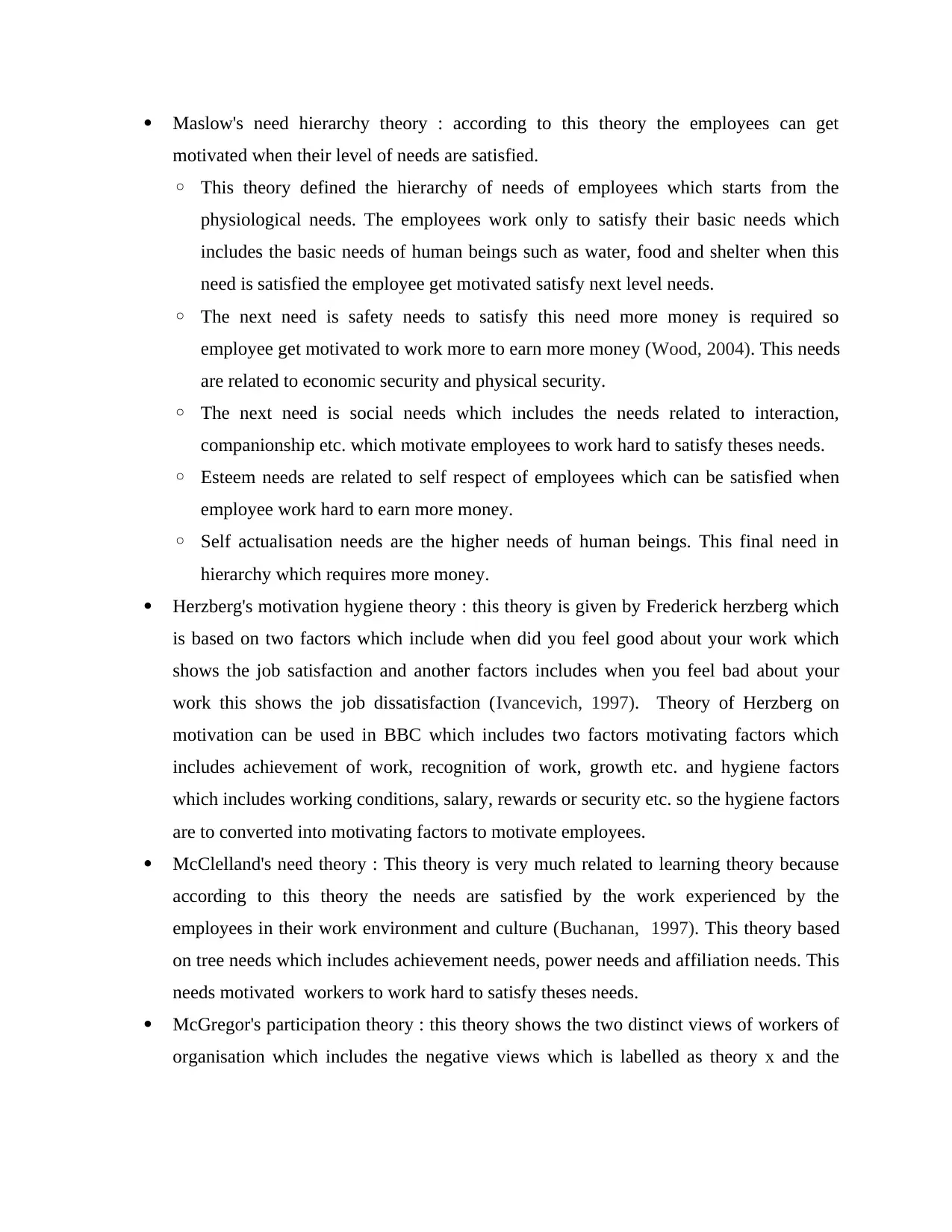
Maslow's need hierarchy theory : according to this theory the employees can get
motivated when their level of needs are satisfied.
◦ This theory defined the hierarchy of needs of employees which starts from the
physiological needs. The employees work only to satisfy their basic needs which
includes the basic needs of human beings such as water, food and shelter when this
need is satisfied the employee get motivated satisfy next level needs.
◦ The next need is safety needs to satisfy this need more money is required so
employee get motivated to work more to earn more money (Wood, 2004). This needs
are related to economic security and physical security.
◦ The next need is social needs which includes the needs related to interaction,
companionship etc. which motivate employees to work hard to satisfy theses needs.
◦ Esteem needs are related to self respect of employees which can be satisfied when
employee work hard to earn more money.
◦ Self actualisation needs are the higher needs of human beings. This final need in
hierarchy which requires more money.
Herzberg's motivation hygiene theory : this theory is given by Frederick herzberg which
is based on two factors which include when did you feel good about your work which
shows the job satisfaction and another factors includes when you feel bad about your
work this shows the job dissatisfaction (Ivancevich, 1997). Theory of Herzberg on
motivation can be used in BBC which includes two factors motivating factors which
includes achievement of work, recognition of work, growth etc. and hygiene factors
which includes working conditions, salary, rewards or security etc. so the hygiene factors
are to converted into motivating factors to motivate employees.
McClelland's need theory : This theory is very much related to learning theory because
according to this theory the needs are satisfied by the work experienced by the
employees in their work environment and culture (Buchanan, 1997). This theory based
on tree needs which includes achievement needs, power needs and affiliation needs. This
needs motivated workers to work hard to satisfy theses needs.
McGregor's participation theory : this theory shows the two distinct views of workers of
organisation which includes the negative views which is labelled as theory x and the
motivated when their level of needs are satisfied.
◦ This theory defined the hierarchy of needs of employees which starts from the
physiological needs. The employees work only to satisfy their basic needs which
includes the basic needs of human beings such as water, food and shelter when this
need is satisfied the employee get motivated satisfy next level needs.
◦ The next need is safety needs to satisfy this need more money is required so
employee get motivated to work more to earn more money (Wood, 2004). This needs
are related to economic security and physical security.
◦ The next need is social needs which includes the needs related to interaction,
companionship etc. which motivate employees to work hard to satisfy theses needs.
◦ Esteem needs are related to self respect of employees which can be satisfied when
employee work hard to earn more money.
◦ Self actualisation needs are the higher needs of human beings. This final need in
hierarchy which requires more money.
Herzberg's motivation hygiene theory : this theory is given by Frederick herzberg which
is based on two factors which include when did you feel good about your work which
shows the job satisfaction and another factors includes when you feel bad about your
work this shows the job dissatisfaction (Ivancevich, 1997). Theory of Herzberg on
motivation can be used in BBC which includes two factors motivating factors which
includes achievement of work, recognition of work, growth etc. and hygiene factors
which includes working conditions, salary, rewards or security etc. so the hygiene factors
are to converted into motivating factors to motivate employees.
McClelland's need theory : This theory is very much related to learning theory because
according to this theory the needs are satisfied by the work experienced by the
employees in their work environment and culture (Buchanan, 1997). This theory based
on tree needs which includes achievement needs, power needs and affiliation needs. This
needs motivated workers to work hard to satisfy theses needs.
McGregor's participation theory : this theory shows the two distinct views of workers of
organisation which includes the negative views which is labelled as theory x and the
⊘ This is a preview!⊘
Do you want full access?
Subscribe today to unlock all pages.

Trusted by 1+ million students worldwide
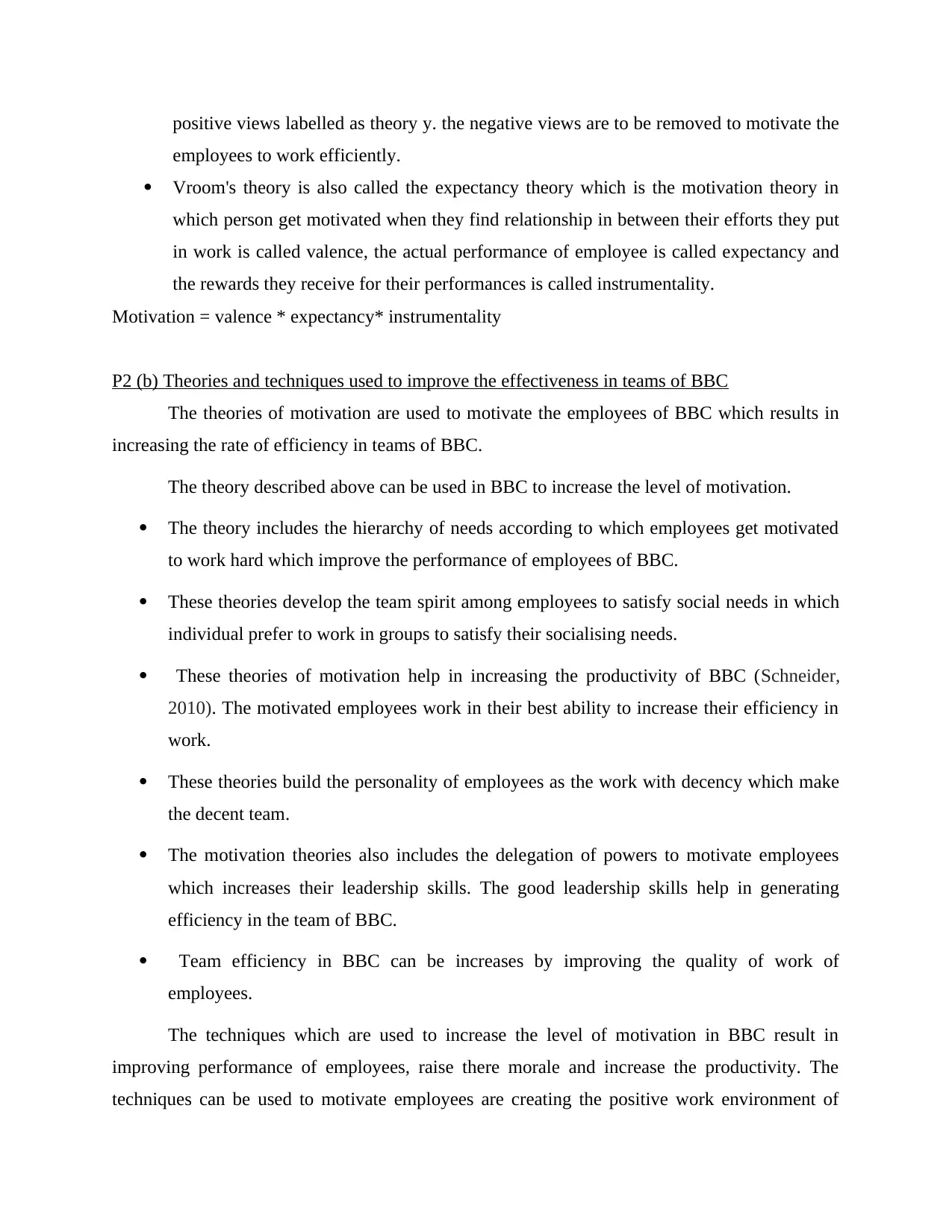
positive views labelled as theory y. the negative views are to be removed to motivate the
employees to work efficiently.
Vroom's theory is also called the expectancy theory which is the motivation theory in
which person get motivated when they find relationship in between their efforts they put
in work is called valence, the actual performance of employee is called expectancy and
the rewards they receive for their performances is called instrumentality.
Motivation = valence * expectancy* instrumentality
P2 (b) Theories and techniques used to improve the effectiveness in teams of BBC
The theories of motivation are used to motivate the employees of BBC which results in
increasing the rate of efficiency in teams of BBC.
The theory described above can be used in BBC to increase the level of motivation.
The theory includes the hierarchy of needs according to which employees get motivated
to work hard which improve the performance of employees of BBC.
These theories develop the team spirit among employees to satisfy social needs in which
individual prefer to work in groups to satisfy their socialising needs.
These theories of motivation help in increasing the productivity of BBC (Schneider,
2010). The motivated employees work in their best ability to increase their efficiency in
work.
These theories build the personality of employees as the work with decency which make
the decent team.
The motivation theories also includes the delegation of powers to motivate employees
which increases their leadership skills. The good leadership skills help in generating
efficiency in the team of BBC.
Team efficiency in BBC can be increases by improving the quality of work of
employees.
The techniques which are used to increase the level of motivation in BBC result in
improving performance of employees, raise there morale and increase the productivity. The
techniques can be used to motivate employees are creating the positive work environment of
employees to work efficiently.
Vroom's theory is also called the expectancy theory which is the motivation theory in
which person get motivated when they find relationship in between their efforts they put
in work is called valence, the actual performance of employee is called expectancy and
the rewards they receive for their performances is called instrumentality.
Motivation = valence * expectancy* instrumentality
P2 (b) Theories and techniques used to improve the effectiveness in teams of BBC
The theories of motivation are used to motivate the employees of BBC which results in
increasing the rate of efficiency in teams of BBC.
The theory described above can be used in BBC to increase the level of motivation.
The theory includes the hierarchy of needs according to which employees get motivated
to work hard which improve the performance of employees of BBC.
These theories develop the team spirit among employees to satisfy social needs in which
individual prefer to work in groups to satisfy their socialising needs.
These theories of motivation help in increasing the productivity of BBC (Schneider,
2010). The motivated employees work in their best ability to increase their efficiency in
work.
These theories build the personality of employees as the work with decency which make
the decent team.
The motivation theories also includes the delegation of powers to motivate employees
which increases their leadership skills. The good leadership skills help in generating
efficiency in the team of BBC.
Team efficiency in BBC can be increases by improving the quality of work of
employees.
The techniques which are used to increase the level of motivation in BBC result in
improving performance of employees, raise there morale and increase the productivity. The
techniques can be used to motivate employees are creating the positive work environment of
Paraphrase This Document
Need a fresh take? Get an instant paraphrase of this document with our AI Paraphraser
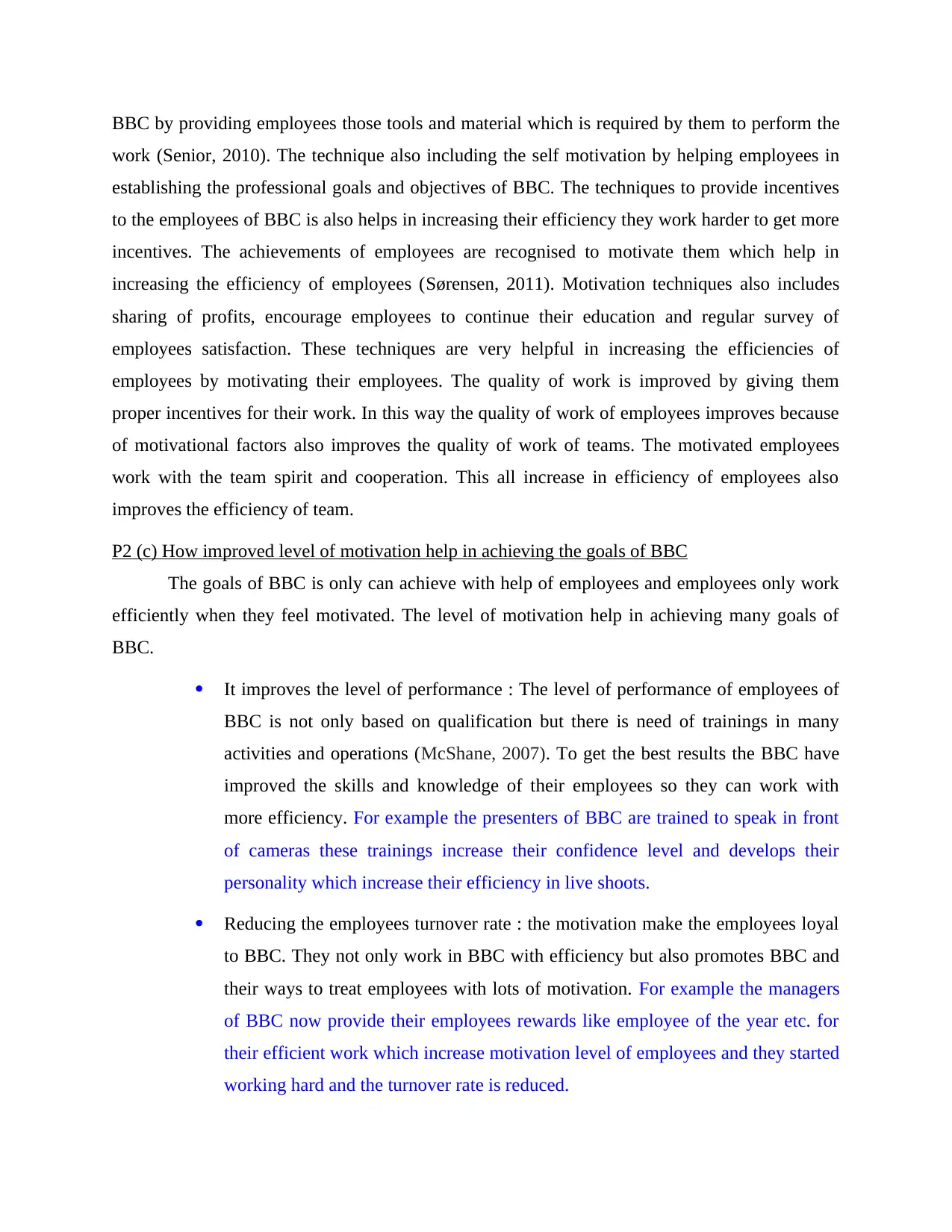
BBC by providing employees those tools and material which is required by them to perform the
work (Senior, 2010). The technique also including the self motivation by helping employees in
establishing the professional goals and objectives of BBC. The techniques to provide incentives
to the employees of BBC is also helps in increasing their efficiency they work harder to get more
incentives. The achievements of employees are recognised to motivate them which help in
increasing the efficiency of employees (Sørensen, 2011). Motivation techniques also includes
sharing of profits, encourage employees to continue their education and regular survey of
employees satisfaction. These techniques are very helpful in increasing the efficiencies of
employees by motivating their employees. The quality of work is improved by giving them
proper incentives for their work. In this way the quality of work of employees improves because
of motivational factors also improves the quality of work of teams. The motivated employees
work with the team spirit and cooperation. This all increase in efficiency of employees also
improves the efficiency of team.
P2 (c) How improved level of motivation help in achieving the goals of BBC
The goals of BBC is only can achieve with help of employees and employees only work
efficiently when they feel motivated. The level of motivation help in achieving many goals of
BBC.
It improves the level of performance : The level of performance of employees of
BBC is not only based on qualification but there is need of trainings in many
activities and operations (McShane, 2007). To get the best results the BBC have
improved the skills and knowledge of their employees so they can work with
more efficiency. For example the presenters of BBC are trained to speak in front
of cameras these trainings increase their confidence level and develops their
personality which increase their efficiency in live shoots.
Reducing the employees turnover rate : the motivation make the employees loyal
to BBC. They not only work in BBC with efficiency but also promotes BBC and
their ways to treat employees with lots of motivation. For example the managers
of BBC now provide their employees rewards like employee of the year etc. for
their efficient work which increase motivation level of employees and they started
working hard and the turnover rate is reduced.
work (Senior, 2010). The technique also including the self motivation by helping employees in
establishing the professional goals and objectives of BBC. The techniques to provide incentives
to the employees of BBC is also helps in increasing their efficiency they work harder to get more
incentives. The achievements of employees are recognised to motivate them which help in
increasing the efficiency of employees (Sørensen, 2011). Motivation techniques also includes
sharing of profits, encourage employees to continue their education and regular survey of
employees satisfaction. These techniques are very helpful in increasing the efficiencies of
employees by motivating their employees. The quality of work is improved by giving them
proper incentives for their work. In this way the quality of work of employees improves because
of motivational factors also improves the quality of work of teams. The motivated employees
work with the team spirit and cooperation. This all increase in efficiency of employees also
improves the efficiency of team.
P2 (c) How improved level of motivation help in achieving the goals of BBC
The goals of BBC is only can achieve with help of employees and employees only work
efficiently when they feel motivated. The level of motivation help in achieving many goals of
BBC.
It improves the level of performance : The level of performance of employees of
BBC is not only based on qualification but there is need of trainings in many
activities and operations (McShane, 2007). To get the best results the BBC have
improved the skills and knowledge of their employees so they can work with
more efficiency. For example the presenters of BBC are trained to speak in front
of cameras these trainings increase their confidence level and develops their
personality which increase their efficiency in live shoots.
Reducing the employees turnover rate : the motivation make the employees loyal
to BBC. They not only work in BBC with efficiency but also promotes BBC and
their ways to treat employees with lots of motivation. For example the managers
of BBC now provide their employees rewards like employee of the year etc. for
their efficient work which increase motivation level of employees and they started
working hard and the turnover rate is reduced.
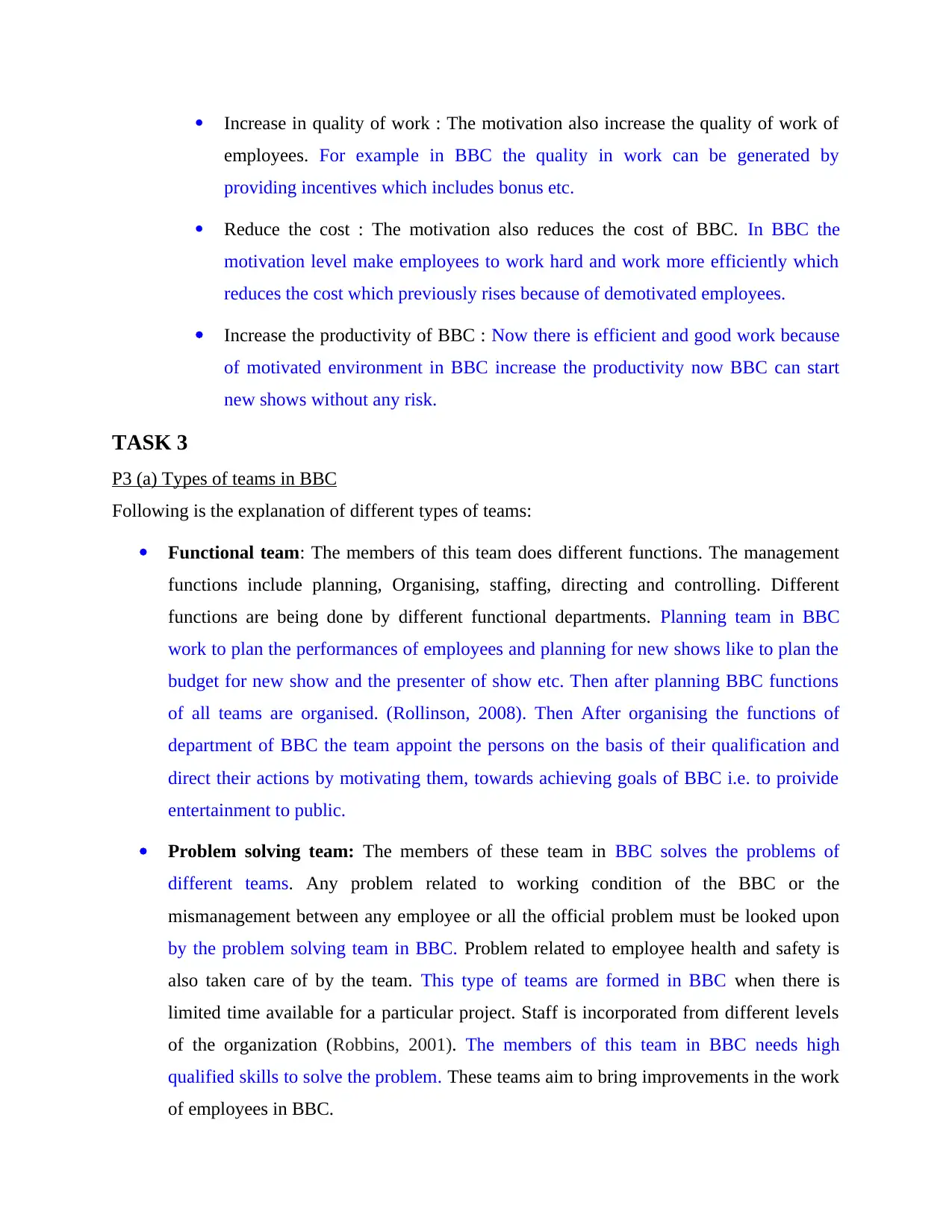
Increase in quality of work : The motivation also increase the quality of work of
employees. For example in BBC the quality in work can be generated by
providing incentives which includes bonus etc.
Reduce the cost : The motivation also reduces the cost of BBC. In BBC the
motivation level make employees to work hard and work more efficiently which
reduces the cost which previously rises because of demotivated employees.
Increase the productivity of BBC : Now there is efficient and good work because
of motivated environment in BBC increase the productivity now BBC can start
new shows without any risk.
TASK 3
P3 (a) Types of teams in BBC
Following is the explanation of different types of teams:
Functional team: The members of this team does different functions. The management
functions include planning, Organising, staffing, directing and controlling. Different
functions are being done by different functional departments. Planning team in BBC
work to plan the performances of employees and planning for new shows like to plan the
budget for new show and the presenter of show etc. Then after planning BBC functions
of all teams are organised. (Rollinson, 2008). Then After organising the functions of
department of BBC the team appoint the persons on the basis of their qualification and
direct their actions by motivating them, towards achieving goals of BBC i.e. to proivide
entertainment to public.
Problem solving team: The members of these team in BBC solves the problems of
different teams. Any problem related to working condition of the BBC or the
mismanagement between any employee or all the official problem must be looked upon
by the problem solving team in BBC. Problem related to employee health and safety is
also taken care of by the team. This type of teams are formed in BBC when there is
limited time available for a particular project. Staff is incorporated from different levels
of the organization (Robbins, 2001). The members of this team in BBC needs high
qualified skills to solve the problem. These teams aim to bring improvements in the work
of employees in BBC.
employees. For example in BBC the quality in work can be generated by
providing incentives which includes bonus etc.
Reduce the cost : The motivation also reduces the cost of BBC. In BBC the
motivation level make employees to work hard and work more efficiently which
reduces the cost which previously rises because of demotivated employees.
Increase the productivity of BBC : Now there is efficient and good work because
of motivated environment in BBC increase the productivity now BBC can start
new shows without any risk.
TASK 3
P3 (a) Types of teams in BBC
Following is the explanation of different types of teams:
Functional team: The members of this team does different functions. The management
functions include planning, Organising, staffing, directing and controlling. Different
functions are being done by different functional departments. Planning team in BBC
work to plan the performances of employees and planning for new shows like to plan the
budget for new show and the presenter of show etc. Then after planning BBC functions
of all teams are organised. (Rollinson, 2008). Then After organising the functions of
department of BBC the team appoint the persons on the basis of their qualification and
direct their actions by motivating them, towards achieving goals of BBC i.e. to proivide
entertainment to public.
Problem solving team: The members of these team in BBC solves the problems of
different teams. Any problem related to working condition of the BBC or the
mismanagement between any employee or all the official problem must be looked upon
by the problem solving team in BBC. Problem related to employee health and safety is
also taken care of by the team. This type of teams are formed in BBC when there is
limited time available for a particular project. Staff is incorporated from different levels
of the organization (Robbins, 2001). The members of this team in BBC needs high
qualified skills to solve the problem. These teams aim to bring improvements in the work
of employees in BBC.
⊘ This is a preview!⊘
Do you want full access?
Subscribe today to unlock all pages.

Trusted by 1+ million students worldwide
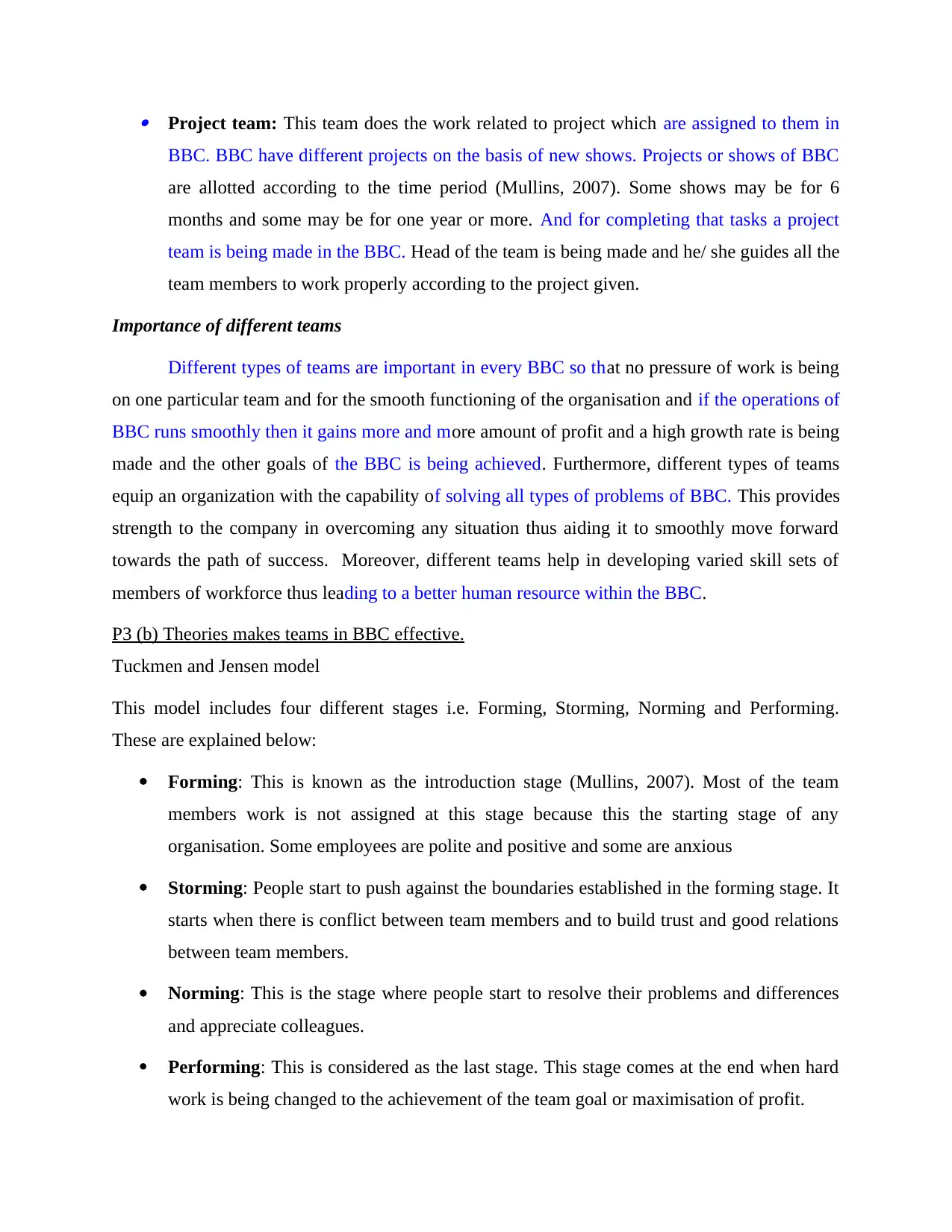
Project team: This team does the work related to project which are assigned to them in
BBC. BBC have different projects on the basis of new shows. Projects or shows of BBC
are allotted according to the time period (Mullins, 2007). Some shows may be for 6
months and some may be for one year or more. And for completing that tasks a project
team is being made in the BBC. Head of the team is being made and he/ she guides all the
team members to work properly according to the project given.
Importance of different teams
Different types of teams are important in every BBC so that no pressure of work is being
on one particular team and for the smooth functioning of the organisation and if the operations of
BBC runs smoothly then it gains more and more amount of profit and a high growth rate is being
made and the other goals of the BBC is being achieved. Furthermore, different types of teams
equip an organization with the capability of solving all types of problems of BBC. This provides
strength to the company in overcoming any situation thus aiding it to smoothly move forward
towards the path of success. Moreover, different teams help in developing varied skill sets of
members of workforce thus leading to a better human resource within the BBC.
P3 (b) Theories makes teams in BBC effective.
Tuckmen and Jensen model
This model includes four different stages i.e. Forming, Storming, Norming and Performing.
These are explained below:
Forming: This is known as the introduction stage (Mullins, 2007). Most of the team
members work is not assigned at this stage because this the starting stage of any
organisation. Some employees are polite and positive and some are anxious
Storming: People start to push against the boundaries established in the forming stage. It
starts when there is conflict between team members and to build trust and good relations
between team members.
Norming: This is the stage where people start to resolve their problems and differences
and appreciate colleagues.
Performing: This is considered as the last stage. This stage comes at the end when hard
work is being changed to the achievement of the team goal or maximisation of profit.
BBC. BBC have different projects on the basis of new shows. Projects or shows of BBC
are allotted according to the time period (Mullins, 2007). Some shows may be for 6
months and some may be for one year or more. And for completing that tasks a project
team is being made in the BBC. Head of the team is being made and he/ she guides all the
team members to work properly according to the project given.
Importance of different teams
Different types of teams are important in every BBC so that no pressure of work is being
on one particular team and for the smooth functioning of the organisation and if the operations of
BBC runs smoothly then it gains more and more amount of profit and a high growth rate is being
made and the other goals of the BBC is being achieved. Furthermore, different types of teams
equip an organization with the capability of solving all types of problems of BBC. This provides
strength to the company in overcoming any situation thus aiding it to smoothly move forward
towards the path of success. Moreover, different teams help in developing varied skill sets of
members of workforce thus leading to a better human resource within the BBC.
P3 (b) Theories makes teams in BBC effective.
Tuckmen and Jensen model
This model includes four different stages i.e. Forming, Storming, Norming and Performing.
These are explained below:
Forming: This is known as the introduction stage (Mullins, 2007). Most of the team
members work is not assigned at this stage because this the starting stage of any
organisation. Some employees are polite and positive and some are anxious
Storming: People start to push against the boundaries established in the forming stage. It
starts when there is conflict between team members and to build trust and good relations
between team members.
Norming: This is the stage where people start to resolve their problems and differences
and appreciate colleagues.
Performing: This is considered as the last stage. This stage comes at the end when hard
work is being changed to the achievement of the team goal or maximisation of profit.
Paraphrase This Document
Need a fresh take? Get an instant paraphrase of this document with our AI Paraphraser
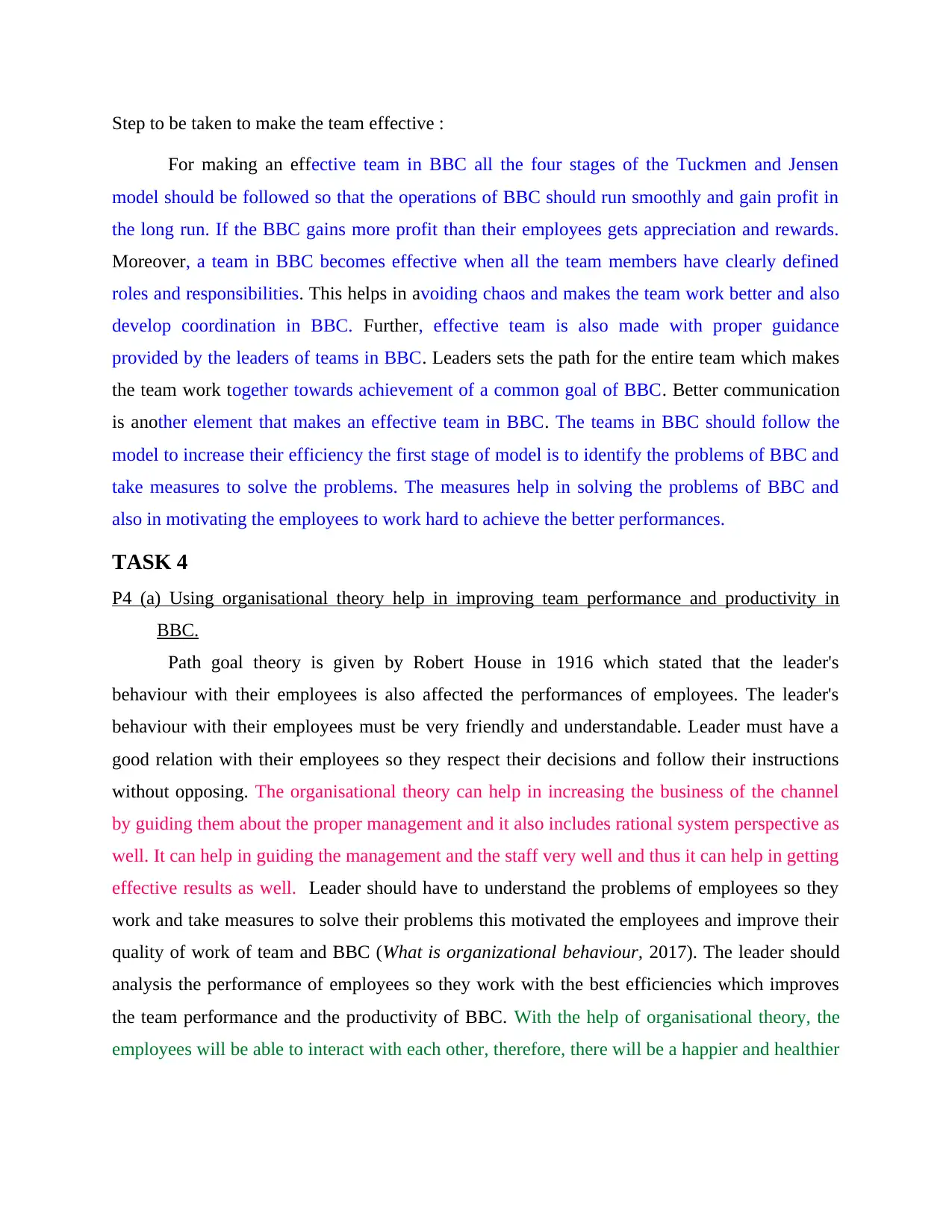
Step to be taken to make the team effective :
For making an effective team in BBC all the four stages of the Tuckmen and Jensen
model should be followed so that the operations of BBC should run smoothly and gain profit in
the long run. If the BBC gains more profit than their employees gets appreciation and rewards.
Moreover, a team in BBC becomes effective when all the team members have clearly defined
roles and responsibilities. This helps in avoiding chaos and makes the team work better and also
develop coordination in BBC. Further, effective team is also made with proper guidance
provided by the leaders of teams in BBC. Leaders sets the path for the entire team which makes
the team work together towards achievement of a common goal of BBC. Better communication
is another element that makes an effective team in BBC. The teams in BBC should follow the
model to increase their efficiency the first stage of model is to identify the problems of BBC and
take measures to solve the problems. The measures help in solving the problems of BBC and
also in motivating the employees to work hard to achieve the better performances.
TASK 4
P4 (a) Using organisational theory help in improving team performance and productivity in
BBC.
Path goal theory is given by Robert House in 1916 which stated that the leader's
behaviour with their employees is also affected the performances of employees. The leader's
behaviour with their employees must be very friendly and understandable. Leader must have a
good relation with their employees so they respect their decisions and follow their instructions
without opposing. The organisational theory can help in increasing the business of the channel
by guiding them about the proper management and it also includes rational system perspective as
well. It can help in guiding the management and the staff very well and thus it can help in getting
effective results as well. Leader should have to understand the problems of employees so they
work and take measures to solve their problems this motivated the employees and improve their
quality of work of team and BBC (What is organizational behaviour, 2017). The leader should
analysis the performance of employees so they work with the best efficiencies which improves
the team performance and the productivity of BBC. With the help of organisational theory, the
employees will be able to interact with each other, therefore, there will be a happier and healthier
For making an effective team in BBC all the four stages of the Tuckmen and Jensen
model should be followed so that the operations of BBC should run smoothly and gain profit in
the long run. If the BBC gains more profit than their employees gets appreciation and rewards.
Moreover, a team in BBC becomes effective when all the team members have clearly defined
roles and responsibilities. This helps in avoiding chaos and makes the team work better and also
develop coordination in BBC. Further, effective team is also made with proper guidance
provided by the leaders of teams in BBC. Leaders sets the path for the entire team which makes
the team work together towards achievement of a common goal of BBC. Better communication
is another element that makes an effective team in BBC. The teams in BBC should follow the
model to increase their efficiency the first stage of model is to identify the problems of BBC and
take measures to solve the problems. The measures help in solving the problems of BBC and
also in motivating the employees to work hard to achieve the better performances.
TASK 4
P4 (a) Using organisational theory help in improving team performance and productivity in
BBC.
Path goal theory is given by Robert House in 1916 which stated that the leader's
behaviour with their employees is also affected the performances of employees. The leader's
behaviour with their employees must be very friendly and understandable. Leader must have a
good relation with their employees so they respect their decisions and follow their instructions
without opposing. The organisational theory can help in increasing the business of the channel
by guiding them about the proper management and it also includes rational system perspective as
well. It can help in guiding the management and the staff very well and thus it can help in getting
effective results as well. Leader should have to understand the problems of employees so they
work and take measures to solve their problems this motivated the employees and improve their
quality of work of team and BBC (What is organizational behaviour, 2017). The leader should
analysis the performance of employees so they work with the best efficiencies which improves
the team performance and the productivity of BBC. With the help of organisational theory, the
employees will be able to interact with each other, therefore, there will be a happier and healthier
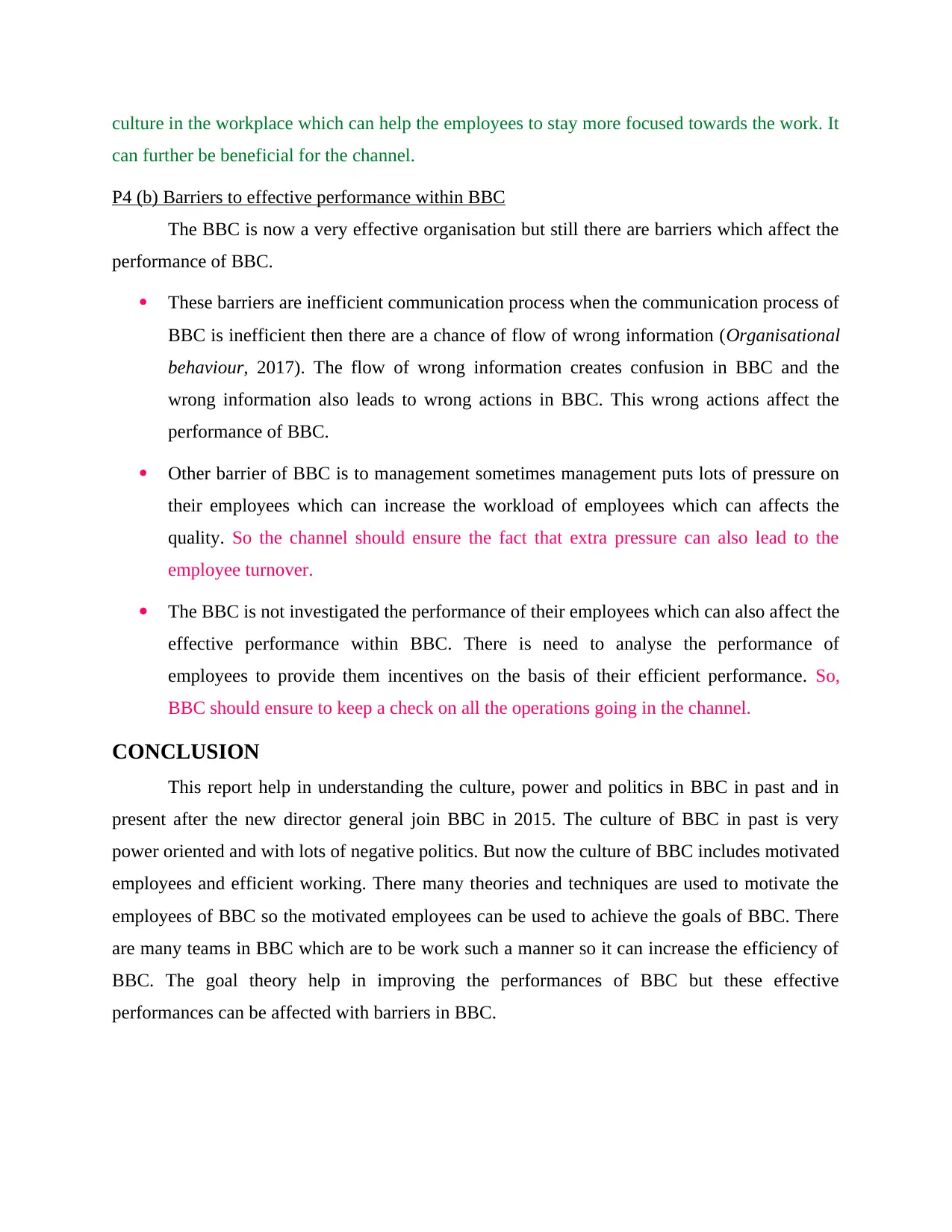
culture in the workplace which can help the employees to stay more focused towards the work. It
can further be beneficial for the channel.
P4 (b) Barriers to effective performance within BBC
The BBC is now a very effective organisation but still there are barriers which affect the
performance of BBC.
These barriers are inefficient communication process when the communication process of
BBC is inefficient then there are a chance of flow of wrong information (Organisational
behaviour, 2017). The flow of wrong information creates confusion in BBC and the
wrong information also leads to wrong actions in BBC. This wrong actions affect the
performance of BBC.
Other barrier of BBC is to management sometimes management puts lots of pressure on
their employees which can increase the workload of employees which can affects the
quality. So the channel should ensure the fact that extra pressure can also lead to the
employee turnover.
The BBC is not investigated the performance of their employees which can also affect the
effective performance within BBC. There is need to analyse the performance of
employees to provide them incentives on the basis of their efficient performance. So,
BBC should ensure to keep a check on all the operations going in the channel.
CONCLUSION
This report help in understanding the culture, power and politics in BBC in past and in
present after the new director general join BBC in 2015. The culture of BBC in past is very
power oriented and with lots of negative politics. But now the culture of BBC includes motivated
employees and efficient working. There many theories and techniques are used to motivate the
employees of BBC so the motivated employees can be used to achieve the goals of BBC. There
are many teams in BBC which are to be work such a manner so it can increase the efficiency of
BBC. The goal theory help in improving the performances of BBC but these effective
performances can be affected with barriers in BBC.
can further be beneficial for the channel.
P4 (b) Barriers to effective performance within BBC
The BBC is now a very effective organisation but still there are barriers which affect the
performance of BBC.
These barriers are inefficient communication process when the communication process of
BBC is inefficient then there are a chance of flow of wrong information (Organisational
behaviour, 2017). The flow of wrong information creates confusion in BBC and the
wrong information also leads to wrong actions in BBC. This wrong actions affect the
performance of BBC.
Other barrier of BBC is to management sometimes management puts lots of pressure on
their employees which can increase the workload of employees which can affects the
quality. So the channel should ensure the fact that extra pressure can also lead to the
employee turnover.
The BBC is not investigated the performance of their employees which can also affect the
effective performance within BBC. There is need to analyse the performance of
employees to provide them incentives on the basis of their efficient performance. So,
BBC should ensure to keep a check on all the operations going in the channel.
CONCLUSION
This report help in understanding the culture, power and politics in BBC in past and in
present after the new director general join BBC in 2015. The culture of BBC in past is very
power oriented and with lots of negative politics. But now the culture of BBC includes motivated
employees and efficient working. There many theories and techniques are used to motivate the
employees of BBC so the motivated employees can be used to achieve the goals of BBC. There
are many teams in BBC which are to be work such a manner so it can increase the efficiency of
BBC. The goal theory help in improving the performances of BBC but these effective
performances can be affected with barriers in BBC.
⊘ This is a preview!⊘
Do you want full access?
Subscribe today to unlock all pages.

Trusted by 1+ million students worldwide
1 out of 14
Related Documents
Your All-in-One AI-Powered Toolkit for Academic Success.
+13062052269
info@desklib.com
Available 24*7 on WhatsApp / Email
![[object Object]](/_next/static/media/star-bottom.7253800d.svg)
Unlock your academic potential
Copyright © 2020–2026 A2Z Services. All Rights Reserved. Developed and managed by ZUCOL.





